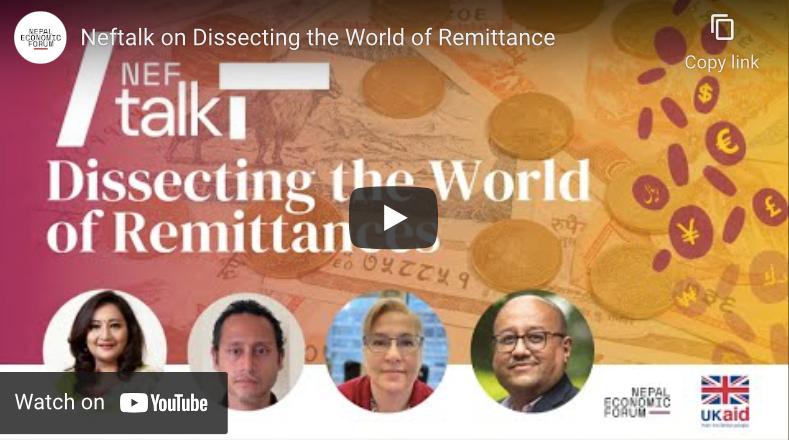Dissecting the Wor of Remittances













Aarti Rana, Deputy CEO, Sunrise Bank Limited



Paras Kharel, Research Director, South Asia Watch on Trade, Economics and Environment (SAWTEE)




oderated by:
Alice J. Brooks, Senior Economist, The World Bank Group, Nepal Sujeev Shakya, Chair, Nepal Economic Forum



Remittances substantially contributes to Nepal’s economic growth. Despite such significance, since this topic is fairly uncharted in Nepal, Nepal Economic Forum (NEF) is striving to dissect and decode the existing patterns of remittance while also attempting to project future trends. Besides, it is estimated that there will be nearly one million Nepalis living in Australia, Canada, the United Kingdom, and the United States by 2030.
An outflow of such nature and magnitude would result in a larger diaspora living abroad, and increased remittances to Nepal.
Against this background, the neftalk session titled ‘Dissecting the World of Remittances’ deconstructed and explored multiple facets of remittance and migration. The panelists discussed formal and informal channels of remittances in Nepal and conferred on some ways to formalize the remittances received through informal channels. The discussions during the event provided a wide range of perspectives around the correlation between remittances and imports, as well as the factors that put pressure on the country’s foreign exchange reserves.




Carrying an experience of the banking sector in Nepal, Aarti Rana discussed the hindrances in formalizing remittances in Nepal. She highlighted that more than 50% of remittances are sent through informal channels, which tend to provide a higher premium than financial institutions. She deduced that remittances through the informal channels are used to fund trade as there is an inverse relationship between remittance and imports. She emphasized on the issue of under-invoicing of imports where the reference price and the actual price differ. This means that only the reference price goes through banking channels, while the balance goes through hundi [1] and may be funded by informal remittances. She added that under-invoicing is a difficult problem to solve as businesses that do not under invoice tend to be less competitive in Nepal.
Further, Aarti emphasized that while the banking sector can play a significant role in formalizing remittances, stricter mechanisms from the government side are necessary to tackle under-invoicing and formalize remittance. She provided examples of some incentives that our neighboring countries have provided to incentivize formal remittance in this regard. She informed that the banking sector is expecting higher deposits from remittances since 20% of all remittances are saved and Nepal Rastra Bank has allowed a 1% extra bonus on fixed deposits. Lastly, she advised the government to create policies to attract investment in Nepal from the large Non-Residents Nepali (NRN) diaspora.
[1] Hundi is an informal remittance transfer system that the central bank of Nepal, Nepal Rastra Bank, does not recognize.






Alice explained that remittances have a multi dimensional positive effect in Nepal and will continue to be a major feature of the economy. She specified the common challenges faced in formal remittance transfer channels, which make it difficult to compete against informal channels. Informal channels continue to give benefits to remitters such as quick delivery, low transaction costs, and security to remitters which the formal channels fail to meet. Therefore, she suggested strengthening formal sector efficiency to breed competition with informal channels so that the formal sector can deliver higher benefits than the informal sector, thereby increasing formal means for remittance.
She further talked about the increasing pressure on Nepal’s foreign exchange reserves due to the country’s increasing trade deficit and declining remittance inflow. She proposed that the government’s policy to ban certain imports should have an expiration date so that the private sector can plan its business activities for the future.
Reflecting on a report published by the International Monetary Fund (IMF) in January 2022, she stated that, Nepal likely has enough foreign exchange reserves to cover 5.5 months of imports, indicating that the country is not in danger of running out of foreign exchange reserves.
Lastly, she considered the major impacts of climate change on the pattern of migrant workers in the future. As alternate sources of energy develop, the price of crude oil may decline in the future, reducing the demand for migrant workers in Gulf countries, where the majority of Nepali migrant workers seek employment. As a result, migration patterns from Nepal may change in the future.



Paras Khanal kickstarted the discussion by explaining the distinct relationship between remittance and imports in Nepal, which creates hurdles for the smooth functioning of the economy. He highlighted that one likely suspect in the correlation between remittance and import is under-invoicing. Due to under-invoicing, foreign exchange is not entering the county, creating pressure on the reserve. Moreover, through under-invoicing, imports are artificially made less costly. As a result, the demand for imports may have been higher than it would have been otherwise. He added that under invoicing is also harming the domestic industry, halting the industrialization process, and pushing people to go abroad. On the other hand, over-invoicing is also an issue because foreign exchanges that are already in our coffers go abroad through over invoicing, creating further strain pressure on the foreign exchange reserve.
Similarly, Paras also highlighted that the central bank of Nepal, Nepal Rastra Bank (NRB), has identified a lack of awareness and inadequate promotion among Non-Resident Nepalis (NRNs) as reasons for the government’s diaspora bonds’ low uptake. He believes that economic diplomacy should include activities to raise awareness of these bonds.
Lastly, Paras mentioned that remittances are a source of effective demand, which can be used to purchase imports or can be met through domestic output. Hence, through the effective implementation of sound industrial policies, remittances can be utilized into effective demand whereby there will be a response in terms of the domestic demand and employment generation.

Sujeev Shakya, the moderator of the session, focused the discussion on remittances coming through informal channels and how they can be formalized. He revolved the conversation toward the role played by the government and policies that can be formulated to formalize remittance. He also emphasized the futuristic prospect of remittance based on the panelist's view and addressed the linkages between under-invoicing and remittance.
He concluded the discussion by describing the world of remittance as vast ranging, from climate change to economic diplomacy to bank to labor market to import to under-invoicing, which requires further work to be carried out.







There is a need to take steps to provide incentives to convert informal remittances to formal remittances in Nepal. For example, strict customs enforcement with regard to under-invoicing is important.
There is an enormous potential for the Non-Resident Nepali (NRN) diaspora to contribute to the country in the form of investments. In this regard, awareness programs should be conducted on the different investment tools available for the NRN diaspora to increase the uptake of the available financial instruments.
Under invoicing of imports has impacted Nepal's foreign exchange reserves and economy by disrupting the country's industrialization process and limiting employment growth.

